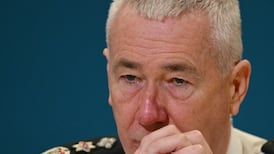The Dáil has for the fourth time unanimously supported a call for the British government to open and allow access to all documents relating to the Dublin and Monaghan bombings, in the week of the 50th anniversary of the attacks.
The House backed a Sinn Féin motion that echoed those in 2008, 2011 and 2016 calling for the Government to continue to press the British government to prioritise and accept all requests for material and assistance from Operation Denton, an independent police review of the activities of the Glennane gang. The loyalist gang is believed to have killed 128 people in the 1970s and 1980s.
Thirty-four people died and 300 people were injured in the no-warning car bombs in Dublin and Monaghan on May 17th, 1974 carried out by the loyalist UVF. .
Sinn Féin leader Mary Lou McDonald who opened the debate, read out the names of all 34 people killed, “33 civilians and a full-term unborn baby, Martha O’Neill – the largest death toll in any single day of the Troubles”.
RM Block
She said the “unimaginable pain and loss had been prolonged by searing injustice” and the British state continues to deny its involvement.
Ms McDonald said “now is the time for the light of truth. Now is the time for Justice for the Forgotten.”
Tánaiste Micheál Martin said the motion passed on Tuesday “will be sent to the British parliament. I hope that lawmakers there take to heart the message that the demand for access to these documents by an independent figure is not going away”.
Members of Justice for the Forgotten, which has represented the families who suffered losses in the bombings, attended the debate along with family members, and were applauded by TDs on their arrival.
Mr Martin said this “British government can have no doubt of the strength of feelings in this House and, more importantly, the salience of the issue for so many families”.
He added that “it is important that we, too, are honest about where we as a government and a society have fallen short on what we owe the victims and survivors of the Dublin-Monaghan bombings”.
The Barron Report made serious criticisms of the original Garda investigation into the bombings, including the failure to make full use of information obtained and weaknesses in forensic analysis, he said.
The high level of engagement “across our political system on this case today is in stark contrast to the muted response of the first two decades following the bombings”. And it was “truly shocking” that “not a single parliamentary question specific to the case was asked, from any quarter, from 1975 until 1991″.
Sinn Féin foreign affairs spokesman Matt Carthy highlighted the failure of the Irish State to investigate the attack, adding that people seemed more concerned that suspicions of British state involvement be suppressed.
He said “the truth is that the British government murdered Irish citizens”. In most incidents they did it covertly, in collusion with loyalists and it was part of the “colonial playbook right across the world”.
Labour foreign affairs spokesman Brendan Howlin said there had been four previous paramilitary bombings in Dublin, including one on Burgh Quay in 1972 in which 40 people were injured, including his sister Jackie and her husband Paddy. Mr Howlin paid tribute to Justice for the Forgotten and said his sister referred to the Burgh Quay bombing as the “forgotten forgotten”.
People Before Profit TD Richard Boyd Barrett held up the shoes of 16-month-old Jacqueline O’Brien who was killed in the bomb along with her four-month old sister Anne-Marie and their mother and father Anna and Johnny O’Brien. Mr Boyd Barrett said the life of Anna’s sister Cathy Doyle, who asked him to show TDs the shoes, had been “indelibly scarred by the loss” of her sister, brother-in-law and nieces.
He said Britain’s wish to hide its involvement showed “something quite dark about the British state, that they won’t give people information about what happened”.


















